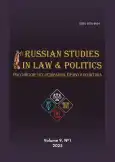Evolution of the Principle of Freedom of Contract as a Fundamental Principle of Civil Law
- Authors: Polynkov D.A.1
-
Affiliations:
- Synergy University
- Issue: Vol 9, No 1 (2025)
- Pages: 108-127
- Section: Статьи
- Published: 31.03.2025
- URL: https://journal-vniispk.ru/2576-9634/article/view/301142
- DOI: https://doi.org/10.12731/2576-9634-2025-9-1-226
- EDN: https://elibrary.ru/BLUMZL
- ID: 301142
Cite item
Full Text
Abstract
The article is devoted to a comprehensive study of the evolution of the principle of freedom of contract as a fundamental element of civil law. The scientific novelty of the work consists in a holistic historical and legal analysis of the formation of this principle in various legal systems, including Romano-Germanic and Anglo-Saxon. Modern challenges to the principle of freedom of contract associated with the digitalization of the economy and the emergence of new forms of contractual relations, such as smart contracts, are considered.
Background. The relevance of the study stems from the need for a comprehensive analysis of the evolution of the principle of freedom of contract in the context of changing economic and legal systems. The existing developments are mainly limited to the study of this principle within the framework of individual legal systems, which determines the need for a comprehensive historical and legal study.
Objective. Comprehensive analysis of the formation and development of the principle of freedom of contract in Russia and the world, revealing the peculiarities of its transformation from ancient civilizations to the modern digital era.
Methodology. Historical-legal and comparative-legal methods of scientific research were used. An interdisciplinary approach with the involvement of economic doctrines and the analysis of legal norms of different legal systems was applied.
Results. The author's periodization of the evolution of the principle of freedom of contract was developed, the key stages of its development were revealed. It is established that the principle of freedom of contract is transformed from absolute freedom to a more balanced approach taking into account social and economic interests. The peculiarities of the realization of the principle of freedom of contract in different legal systems, including in the context of modern digital transformations, are revealed. The results of the study demonstrate the dialectical nature of the principle of freedom of contract, which is constantly transforming, maintaining a balance between individual autonomy and social interests.
Scope of application of the results. The results of the study can be used in scientific activity in the study of civil law, in lawmaking work to improve contractual legislation, in the educational process in the training of specialists in law and economics.
About the authors
Daniil A. Polynkov
Synergy University
Author for correspondence.
Email: daniil09032001@gmail.com
SPIN-code: 4325-6475
PhD student of the Department of Legal Regulation of Business
Russian Federation, 9/14, Meshchanskaya Str., Moscow, 129090, Russian FederationReferences
- Asknazii S. I. Civil law and regulated economy / S. I. Asknazii, B. S. Martynov. L.: edition of the Scientific Society of Marxists, 1927, 108 p.
- Volos A. A. Freedom of contract in the history of jurisprudence. Legality and law and order in modern society, 2014, no. 17, pp. 42-51.
- Volos A. A. Smart-contract and the principles of freedom of contract. Legal Policy and Legal Life, 2020, no. 1, pp. 59-64.
- Civil Code of France (Napoleon Code) / Per. from Fr., preface, commentary and notes by V. N. Zakhvataev. Moscow: Infotropic Media, 2012, 592 p.
- Zykova T. A. History of the development of the principle of freedom of contract in the Russian civil law. Territory of science and education, 2024, no. 2, pp. 43-46.
- Ivanov A. S. History of the formation and development of the principle of freedom of contract in the Roman Empire. Izvestia Tula State University. Economic and legal sciences, 2019, no. 2, pp. 116-123.
- Klimova A. N. From the history of the development of the principle of freedom of contract in Russian civil law. Yuridicheskaya nauka, 2015, no. 2, pp. 48-53.
- Ozhegov S. I. I., Shvedova N. Yu. Explanatory Dictionary of the Russian Language / Russian Academy of Sciences. V. V. Vinogradov Institute of Russian Language. 4th ed., supplement. M.: Azbukovnik, 1997, 944 p.
- Pokrovsky I.A. Basic Problems of Civil Law. М., 2001, 342 p.
- Resolution of the All-Russian Central Executive Committee of 11.11.1922 (with amendments of 02.02.1923) “On enactment of the Civil Code of the R.S.F.S.R.” (together with “Civil Code of the R.S.F.S.S.R.”) URL: https://www.consultant.ru/cons/cgi/online.cgi?req=doc&base=ESU&n=2863#cMqHXgUWWc3dDUgm
- Draft Federal Law No. 419059-7 “On Digital Financial Assets”. URL: https://www.ib.ru/law/81
- Federal Law “On Amendments to Parts One, Two and Article 1124 of Part Three of the Civil Code of the Russian Federation” dated 18.03.2019 N 34-FZ. URL: https://www.consultant.ru/document/cons_doc_LAW_320398/
- LawTeacher. November 2013. Contract Law and Principles. https://www.lawteacher.net/free-law-essays/contract-law/contract-law-and-principles.php?vref=1
- Printing and Numerical Registering Co. v. Sampson (1875) L.R. 19 Eq. 462.
- Roscoe Pound, the End of Law as Developed in Juristic Thought 11, 30 HARv. L. REv 201, 204 (1917).
- Spain v Europian Commission, C-240/97. Europian Court. 1999.
- Tedoradze I. The Principle of Freedom of Contract, Pre-Contractual Obligations Legal Review English, EU and US Law. European Scientific Journal, February 2017, vol. 13, no. 4, p. 65.
Supplementary files










